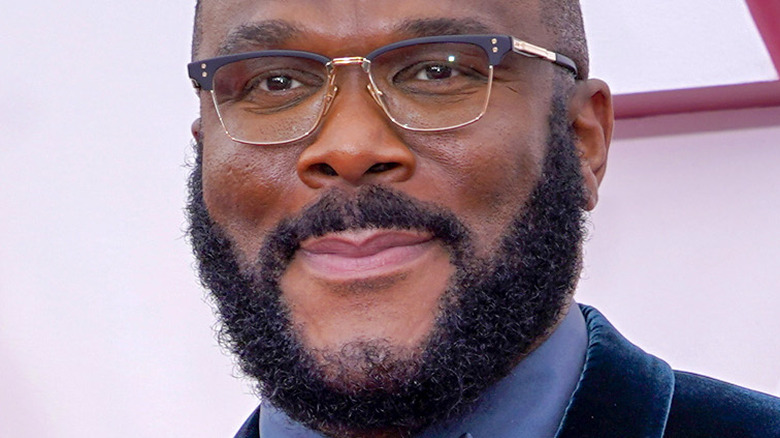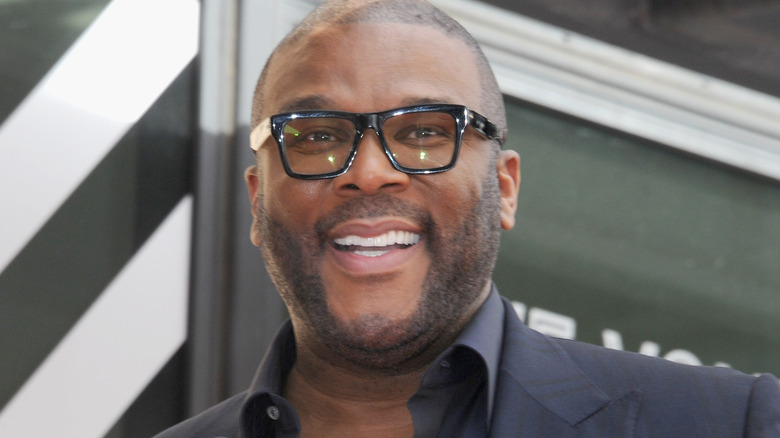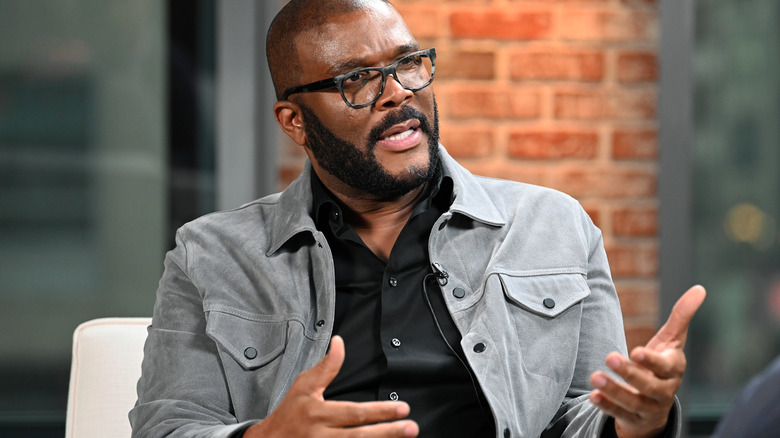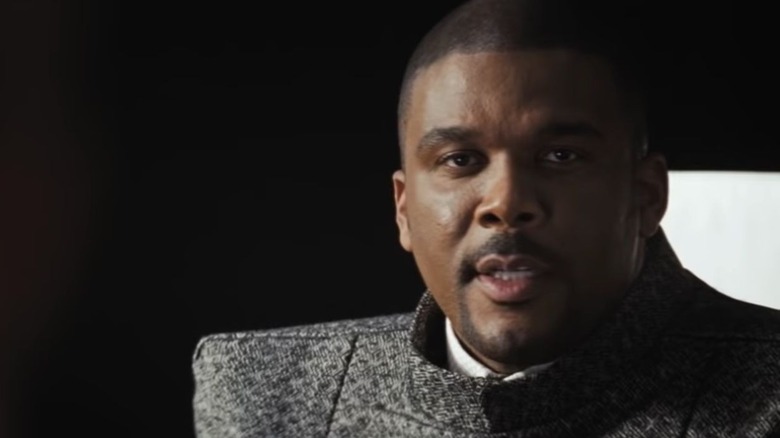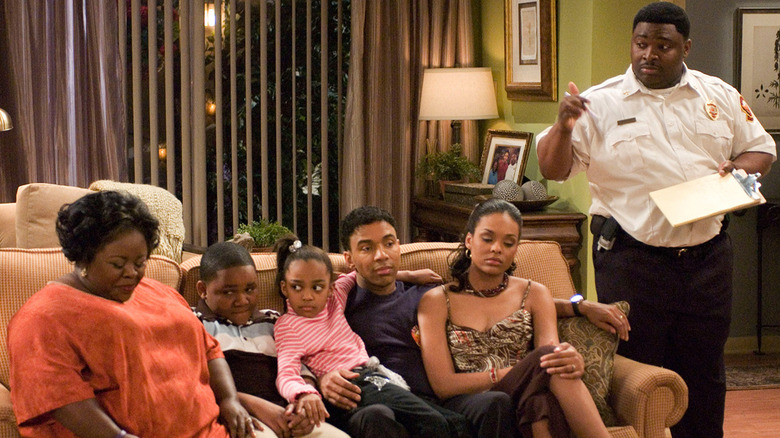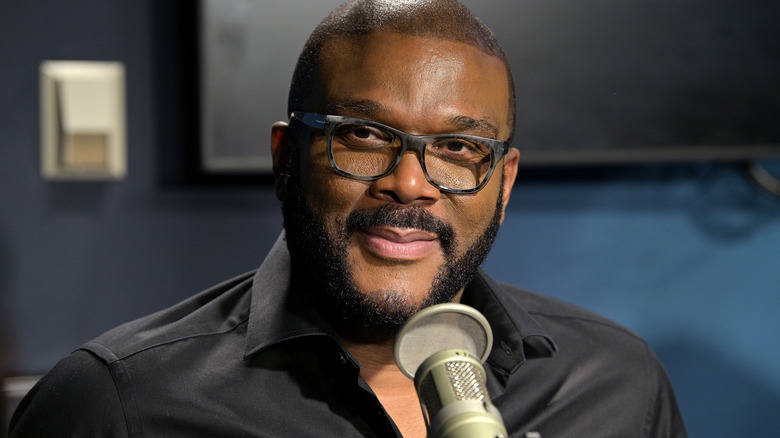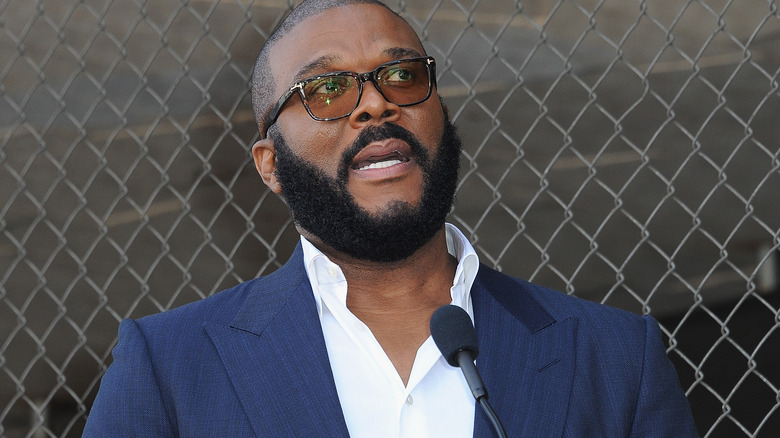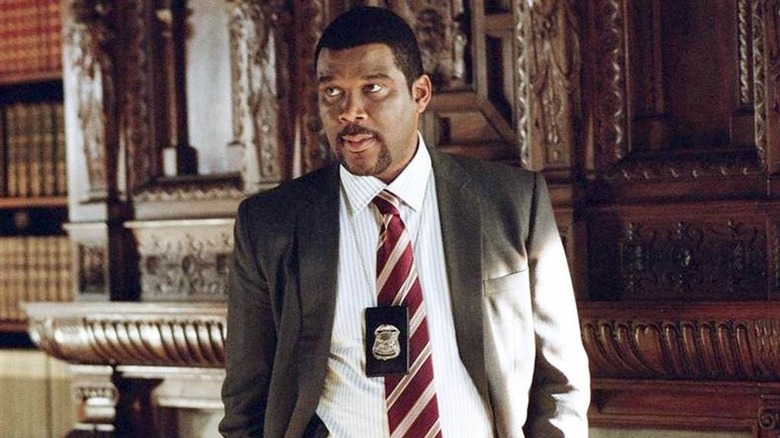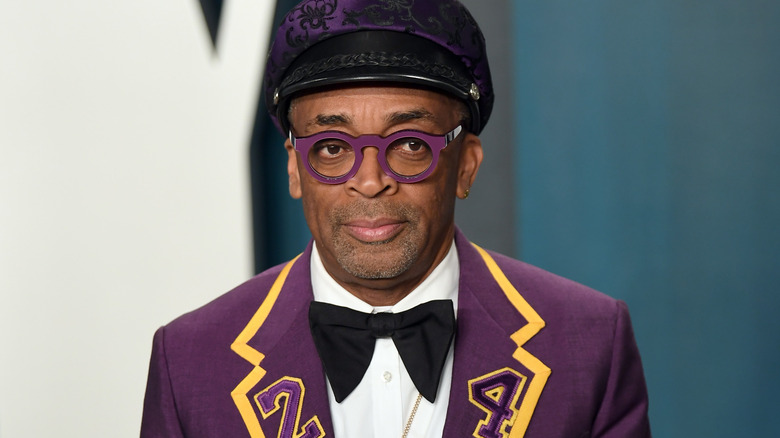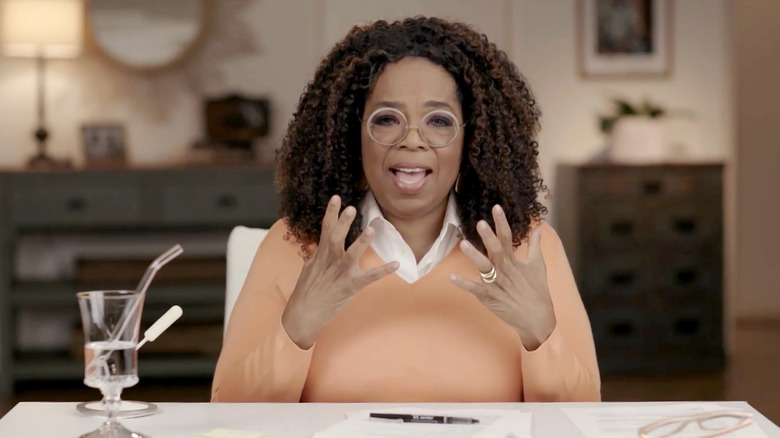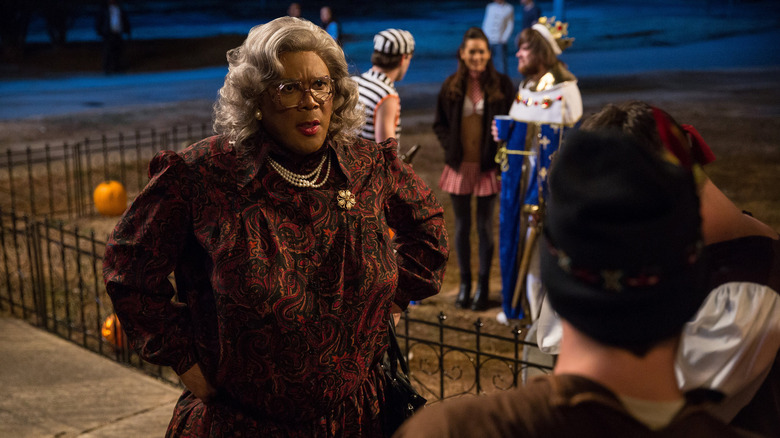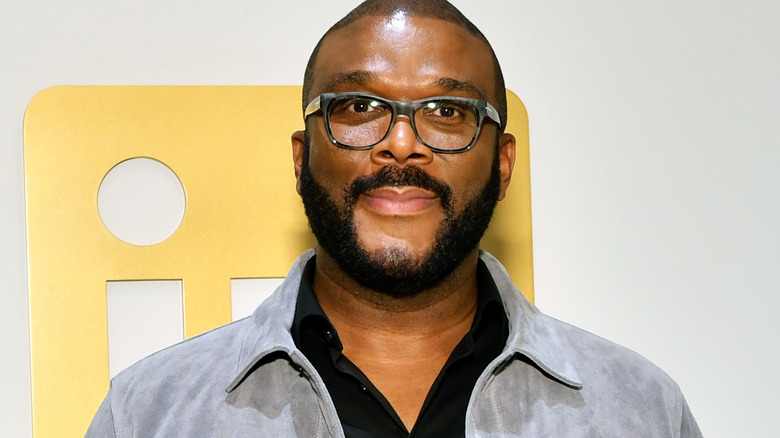The Untold Truth Of Tyler Perry
Ever since showing up on the Hollywood scene in 2005, Tyler Perry has been a steady pop culture presence. Partly, this is due to just how many film, television, and stage projects he works on annually. It's also thanks to how he changed the game for Black creators and how they have ownership over the properties they've created. And, on top of everything else, it's because his films resonate with a wide audience. Films like "Madea Goes to Jail" aren't beloved by critics, but their consistently strong box office performances indicate they've proven popular enough with moviegoers to solidify Perry as a major draw for over a decade now.
Even given how ubiquitous Perry is in the pop culture landscape, there's still plenty about this media figure that isn't widely talked about. Parts of his career — like which specific projects brought him to TV for the first time, his creative partnership with the Oprah Winfrey Network, or his lifetime achievements at the worldwide box office — may not be common knowledge. However, they speak to the kind of work ethic and enormous fanbase Perry has cultivated in his time spent in the cinematic spotlight.
How Tyler Perry became a playwright
Tyler Perry is most famous now for his movies, but he got his start as a playwright. This is where the character of Madea first came to life, and many of Perry's movies have been based off plays he wrote. However, Perry didn't initially set out to be a writer. But after struggling with depression and a childhood of abuse, he was inspired by something he heard on Oprah Winfrey's show — that writing could be a therapeutic tool. So he began writing a series of letter that dealt with his deeply personal problems. Eventually, Perry began to compile enough of these letters that he felt like they had to be shared to the world.
These letters inspired Perry's first play, "I Know I've Been Changed." A deeply personal work that immediately solidified how Perry's projects are full of life lessons, this inaugural piece of playwriting initially struggled to garner any attention. During its first run, just 30 people showed up, and according to Biography, Perry had to work random jobs and live out of his car while taking the show to various cities. Eventually, he found success in Atlanta, with the play giving birth to his dedicated fanbase. Who knew a bunch of personal letters would be the inspiration behind such a long and successful career?
If you or someone you know may be the victim of child abuse, please contact the Childhelp National Child Abuse Hotline at 1-800-4-A-Child (1-800-422-4453) or contact their live chat services.
He helped finance his first movie
These days, if Tyler Perry wants to make a movie, that thing gets made asap. After all, he's a major player in the Hollywood scene. But his very first foray into cinema, "Diary of a Mad Black Woman," was a different story. After all, Perry wasn't a household name yet, and his movie was plagued by financing problems. So, in order to get the film made and maintain a level of creative control on the project, Perry decided to use his own money to finance the movie.
"I own everything I've ever done and will continue to," Perry said to MTV. "I did a whole script and decided I was going to finance the whole thing and do direct-to-DVD. Then Lionsgate came in and said, 'We'll let you do what you want to do.' I said, 'You can't bother me. It's got to be true to what I know it should be.' I financed 50% of it; they financed 50%." With the financing secured, "Diary of a Mad Black Woman" was able to come to the screen and establish Perry as a filmmaker worth recognizing. In the process, the director also established his affinity for having a sense of ownership over his work.
A Star Trek cameo was a breakthrough for Perry as an actor
In 2009, Tyler Perry set a course for his own "strange new world" — acting in film that he didn't either write or direct. For the first time since he broke out with "Diary of a Mad Black Woman," Perry was going appear in a movie that he didn't personally develop. This particular project was the 2009 reboot of "Star Trek," in which he played the role of Admiral Barnett for director J.J. Abrams.
As someone known for his comedy as opposed to sci-fi, Perry may not seem like an obvious choice to be a part of the "Star Trek" universe, but apparently, Abrams himself was the one who insisted he join this cinematic voyage. "J.J Abrams is a fan and he called and asked me if I would be interested in doing the film and I was shocked," Perry explained via TrekMovie.com. "The timing was perfect, and it was only a week. It's a really small role. It really helped me to see what it's like to be on someone else's set." Not only did Perry get to step outside of his cinematic comfort zone here, but he got to forever be a part of "Star Trek" mythology, one of the most expansive lore's in all of pop culture.
House of Payne was Perry's first foray into television
In addition to his work in films, Perry has also become a fixture of television, a career path that began with the sitcom "House of Payne." Debuting on TBS in June 2007, the show debuted to massive viewership that made it immediately apparent that Perry was able to carry his fanbase over into the world of TV.
"House of Payne" would go on to air in its original run until August 2012, producing hundreds of episodes in the process. Even with the ongoing success of "House of Payne," Perry didn't restrict his TV pursuits to this one show. In fact, "Payne" opened up the door for Perry to produce other TV shows like "Meet the Browns" and "For Better and For Worse." And while "House of Payne" ended in 2012, the show's enduring popularity in reruns led to it being revived on BET in September 2020. Perry has been behind several other lucrative TV shows over the years, but "House of Payne" — his first endeavor in this storytelling domain — remains one of his most well-known accomplishments.
The expanding presence of Tyler Perry Studios
Tyler Perry has frequently broken new ground for entertainers in Hollywood, and that includes his own Tyler Perry Studios. Started up in 2006, the original headquarters for Tyler Perry Studios drew a lot of attention for how much land it occupied. However, over a decade later, this production company moved into an even larger location in Atlanta, Georgia, one that included an impressive array of soundstages. Each named after a notable Black figure in the entertainment industry, a wide variety of productions have shot on this property, including episodes of "The Walking Dead" and scenes in "Black Panther" and "Coming 2 America."
By expanding Tyler Perry Studios in this manner, Perry has continued to rewrite his own story. A man who once struggled to even get his plays performed in independent theaters is now the owner a film studio that only continues to grow and grow. It's a groundbreaking move that increases Perry's creative autonomy as he continues to expand how many projects he's involved in. In other words, the creation and expansion of Tyler Perry Studios are both instances of Perry redefining the rules in Hollywood for what Black entertainers can accomplish.
Perry prefers writing his projects by himself
Looking over his work, it's pretty apparent that Perry likes to maintain a heavy amount of creative control over his properties. Not only does he write his films himself, but he also — save for the occasional exception like "For Colored Girls" — only works with his own original content or adapts his own preexisting work. This was made explicit at the start of 2020 when Perry went to Instagram to talk about all the scripts he'd managed to write in 2019. "I don't know if you know this, but all shows on television have a writers room, and most of the time, there are 10 people, 12, whatever that write on these television shows," Perry said. "I have no writers room. Nobody writes any of my work. I write it all."
This post drew its fair share of criticism, particularly from writers who felt that Perry, by taking full creative control on his productions, wasn't offering up new opportunities to marginalized writers. This decision remains controversial, but it does objectively reflect the kind of creative approach Perry has always taken to his work. Dating back to his days as an independent playwright, Perry has always maintained full control over what he puts his name on.
He's only the second actor to play Alex Cross
The character of Alex Cross — one of pop culture's greatest detectives — became incredibly popular thanks to the books of James Patterson. And the investigator made his big-screen debut with a pair of Morgan Freeman vehicles, "Kiss the Girls" and "Along Came a Spider." After those two films, the character went dormant for over a decade. Then, in October 2012, Cross returned to movie theaters everywhere with the appropriately titled "Alex Cross." This time, Freeman was out, and Tyler Perry was in as the titular character.
Going the action movie route was massive departure for Perry, not only because it was a sharp tonal departure from his most famous films but also because he wasn't writing or directing this project. Perry was merely meant to be a leading man for this second cinematic incarnation of the Alex Cross character. But despite the super sleuth being such a popular character, this new take on the property flamed out at the box office. Grossing just $35.4 million worldwide, "Alex Cross" came in beneath the worldwide grosses of many prior Perry vehicles, and it didn't come close to turning a profit. While Freeman managed to headline two separate Cross adventures, the box office results of this 2012 flick ensured that the Perry version only stuck around for one movie.
Tyler Perry's feud with Spike Lee
In 2009, Spike Lee opined on the films of Tyler Perry by saying he found them "concerning" because of their use of characters that he saw adhering to dangerous stereotypes associated with Black people. It wasn't long before Perry shot back, making it clear he wasn't happy with the director's comments. "I'm so sick of hearing about damn Spike Lee," Perry responded (via The Hollywood Reporter). "Spike can go straight to hell! You can print that. I am sick of him talking about me. ... I am sick of him talking about Black people going to see movies."
A feud between any two major filmmakers is bound to capture people's attention, and the Perry/Lee squabble certainly generated plenty of publicity. But eventually, Perry said the difficulties between himself and Lee were now a thing of the past. Turns out, their issues evaporated once they began talking to one another instead of just about one another. "Spike called me a few years ago, and he came to my house. We sat down and had a great conversation," Perry explained (via Urban Hollywood). "The beauty is that's what I'm hoping people will understand. ... With this moment for me and Spike is a huge moment.
Perry and his 'fly' take on Baxter Stockman
For the 2016 film "Teenage Mutant Ninja Turtles: Out of the Shadows," Perry took on the role of recurring Ninja Turtles baddie Baxter Stockman. A nefarious scientist, Stockman has always been depicted as being a man/fly hybrid in his various incarnations. For "Out of the Shadows," Perry's Stockman, depicted as a dorky scientist hired by Shredder to make new animal/human hybrids, is shown to simply be a human, right down to his final moments on-screen where he's thrown into a car by Shredder's henchman.
However, just because Stockman didn't take on his familiar insect form in "Out of the Shadows," that doesn't mean there weren't plans to have the character grow a fly head in subsequent "Ninja Turtles" adventures. Perry referenced this potential development in a June 2016 interview where he mentioned, "Maybe the fly is coming, I don't know, we'll see." The vagueness of Perry's comments make it apparent he wasn't all in the know on where his character would go next, but he and moviegoers would never get a chance to get concrete answers. The severe box office underperformance of "Out of the Shadows" ensured that Perry would never get to take his version of Baxter Stockman to its next stage.
Perry's long-term deal with the Oprah Winfrey Network
Tyler Perry and Oprah Winfrey have frequently worked together on a variety of projects, ranging from "Precious" (which they both produced) to "The Star" (on which they both provided voicework). However, the duo's partnership went to a whole new level with the announcement in 2012 that Perry would be producing original TV programming for Oprah Winfrey's newest media venture, the Oprah Winfrey Network (OWN). "It's a dream realized to partner with Oprah and bring scripted programming to OWN," Perry said about the news. "She has accomplished so much with the network, and I'm excited to work with her to be a part of its continued growth."
This partnership resulted in one of the network's most successful programs, "The Haves and the Have Nots," which scored record-high levels of viewership for OWN. But Perry's contributions to the network didn't stop with just one show. He's also produced successful series like "Love Thy Neighbor" and "If Loving You Is Wrong." So yeah, when you combine the forces of Tyler Perry and Oprah Winfrey, it should come as no surprise that the results are insanely successful.
Top Five inspired Boo! A Madea Halloween
It's difficult to explain where artists get their ideas from. For some, they just come out of nowhere, while others are informed by a confluence of personal events stirring up deep personal responses that could only manifest through art. For Perry, the idea for his 2016 directorial effort "Boo! A Madea Halloween" came from a most unexpected place — a Chris Rock movie.
The 2014 Rock feature "Top Five" has a scene where moviegoers are lining up around the block for a then-fictitious film entitled "Boo! A Madea Halloween." In the context of the film, it was actually meant to be a skewering of Perry's works, but it ended up inspiring the filmmaking. "Madea" distributor Lionsgate apparently pitched the idea of making the movie for real to Perry, who responded positively to the notion. From there, "Boo! A Madea Halloween" went from an in-movie gag in "Top Five" to something that would actually end up in a movie theater.
Art imitated life as "Boo!" ended up becoming a major sleeper hit, a movie that people actually did line up around the block to see.
Perry's movies have grossed a staggering amount
Tyler Perry's movies have been box office successes from the get-go, with "Diary of a Mad Black Woman" being a big enough hit to pave the way for him to write, direct, and star in future films. Since then, he's continued to deliver a number of major box office successes, including "Madea Goes to Jail" and "Boo! A Madea Halloween." And even with his films rarely scoring much in the way of international distribution, Perry has headlined enough hits to amass a staggeringly impressive sum of cash.
Movies that feature Perry in behind-the-scenes roles have now grossed over $1 billion worldwide. This includes titles he's produced like "Precious" and "Peeples," but the majority of the films that comprise this haul are the ones Perry has written and directed. It's a testament to the consistent and sizeable fanbase Perry has amassed over the years. Perry wasn't a fly-by-night talent, but rather, he's someone who's been able to maintain serious audience engagement with hit film after hit film, to the tune of over $1 billion.
